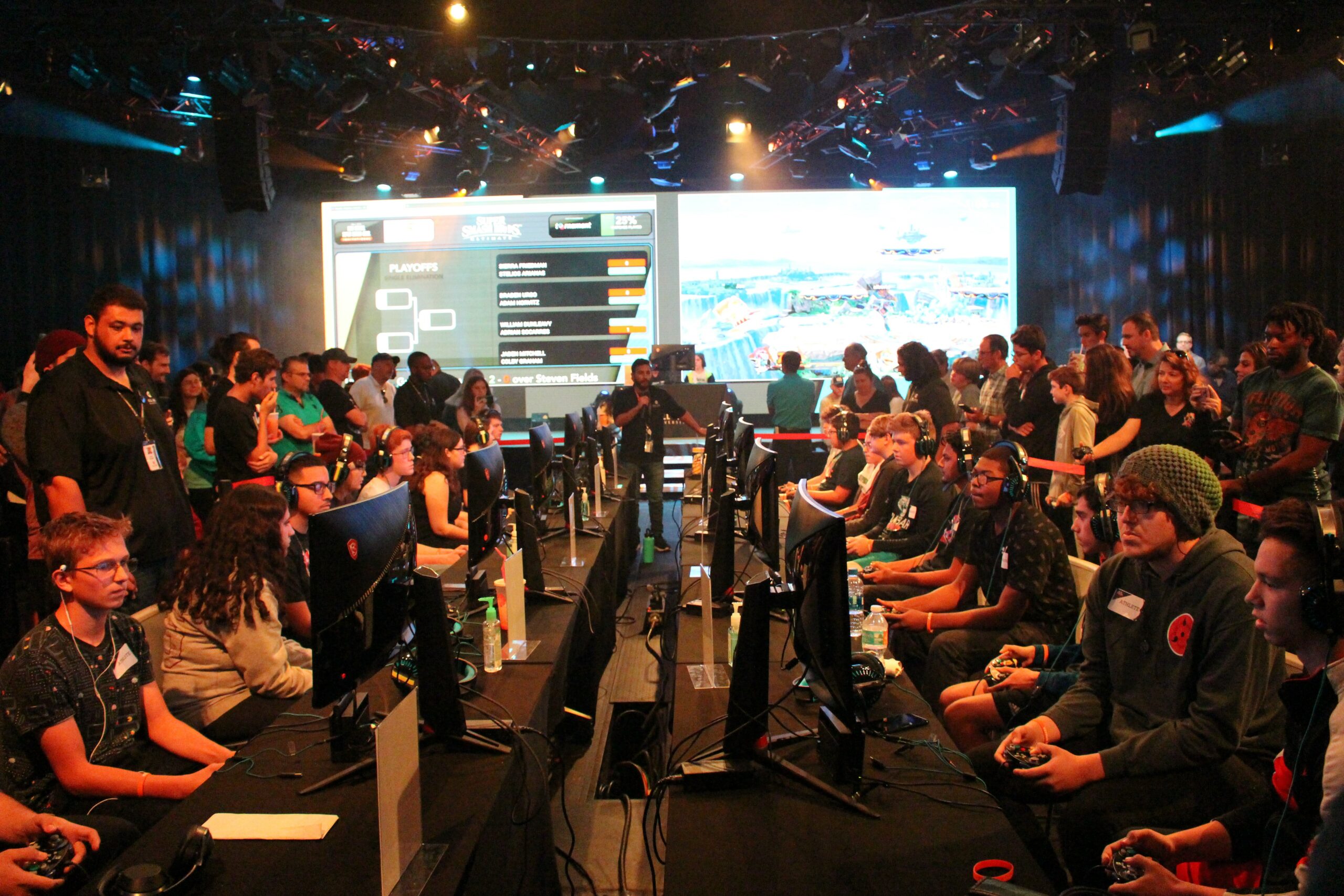In the second part of our series on Schools With Cool Esports Facilties (Here is a link to Part 1), we look at five more groundbreaking college venues that push the boundaries of space, equipment and audio-visual technology. These arenas are some of the biggest and best in the nation … some featuring multiple spaces, some serving as production-style theaters and some that simply offer the latest in amazing upgrades. The beauty of them is that they not only allow for serious game play (and in many cases, for spectators to watch) but they also foster student development. While the space your school can build or expand may have a smaller footprint, these five show offer a glimpse into what is possible with a little insight and a lot of planning.
AKRON UNIVERSITY, Akron, Ohio
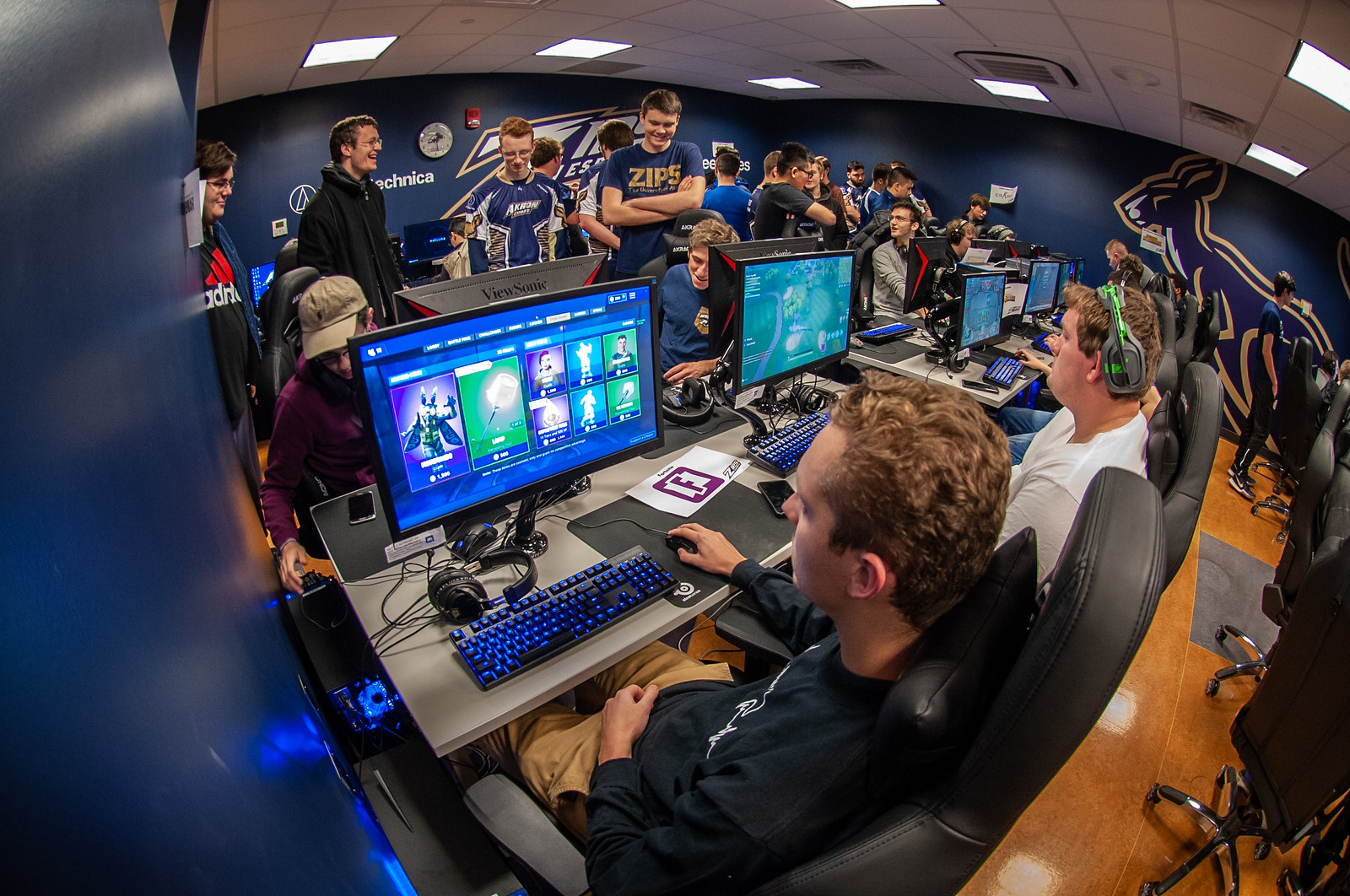
The Zips, one of the first colleges to compete as a varsity squad, won the 2019 national championship in one of esports’ most popular titles, Rocket League. But its facility, which features three distinct spaces on campus, isn’t just for the hardcore gamer; it is completely free to use for any Akron student to use, along with other gaming clubs, which number 17.
“This leads to gaming events on campus pretty much every night of the week and helps students to build a really cool community of gamers on campus,” says Nate Meeker, director of esports. “They help students that are interested in competing in esports but may not have PCs of their own be able to play when they otherwise would not have been able.”
In all, Akron’s dedicated esports area is more than 5,000 square feet – 2,600 in the Student Center, 1,300 in the honors college gaming cafÁ©, and more than 1,200 on the first floor of the InfoCision Stadium-Summa Field – a forward-thinking plan that was forged by Michael Fay (who is now at Rutgers University). There are 95 PC stations, more than 30 console stations, a viewing lounge, a varsity arena and a broadcasting room. Talk about fun for all!
OTTAWA UNIVERSITY, Ottawa, Kan.
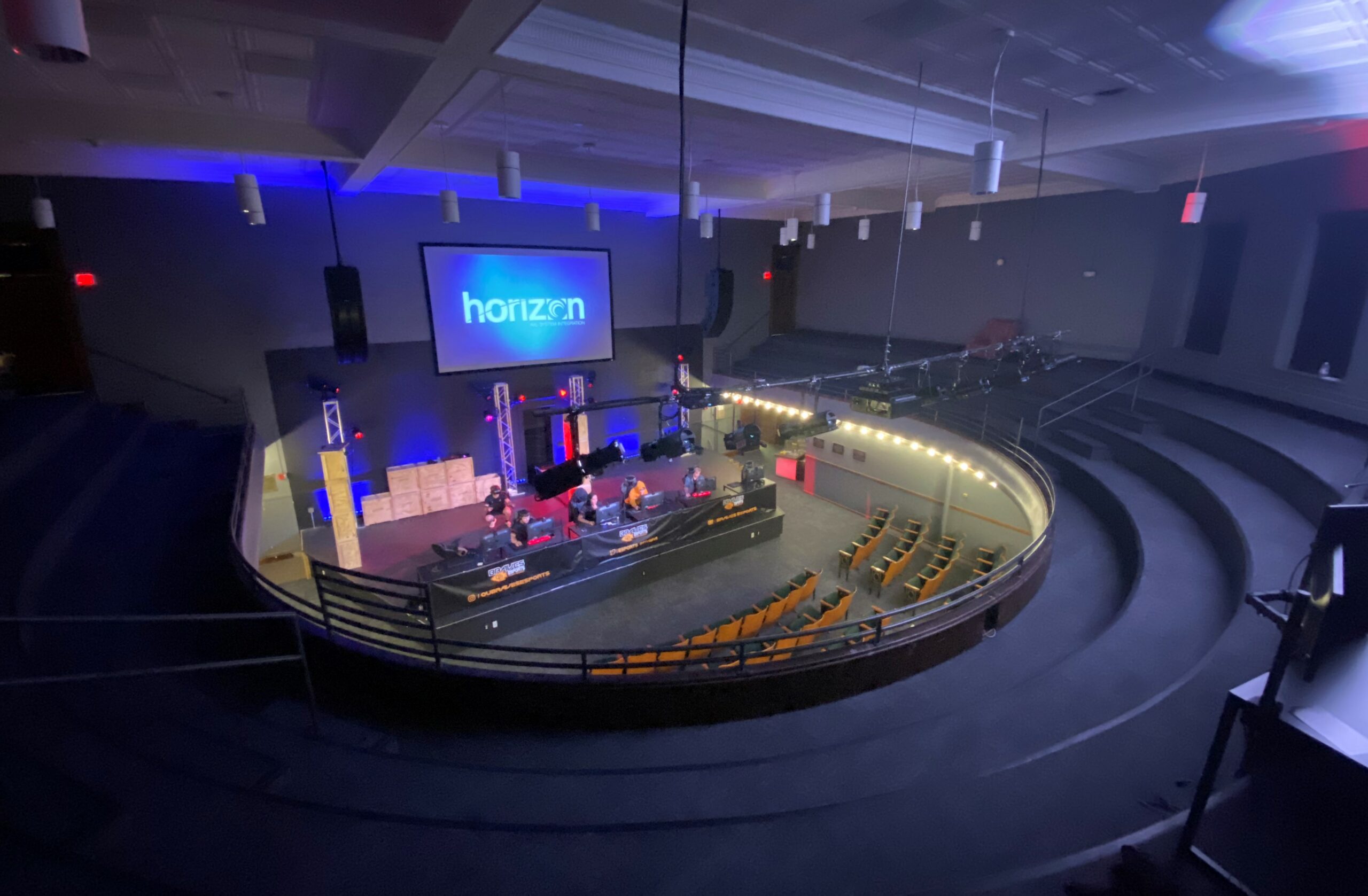
Quite possibly the most visionary of all esports arenas in the nation, this private school (with 670 undergrads) converted an auditorium built in 1898 on campus into a modern, high-tech digital space. But unlike most arena rebuilds, Ottawa managed to keep a lot of historical elements – old-time green-fabric seating for 200 on the floor, original decorative wood mouldings and big-bulb lighting across the balcony faÁ§ade – that make this theater truly one of a kind.
Before the revamp, this space was really in rough shape. Executive director of esports Connor Alne and his team hauled bags of trash and furniture onto a John Deere Tractor during cleanup. Workers painted the entire room (using black behind the stage), added new carpeting and installed blackout curtains before CDW and Josh Kell at Horizon AVL took over with A/V, lighting, integration and the massive projection screen.
The result is a stage setup of workstations for players that face the crowd, during all events that are open to the public. Up in the balcony, there is a production and A/V booth, a shoutcaster station, a streaming station and coaches corner.
“It’s truly groundbreaking in that it’s not only an esports arena, but it is a 200-person spectator arena and is a modern-day broadcasting space,” Alne said during the facility rebuild. “Everything in here can be broadcast or livestreamed just like an ESPN setup. There’s not a lot of spaces like this in college esports. It shows our players how much we care about them and how much our university cares about this program.”
BOISE STATE UNIVERSITY, Boise, Idaho
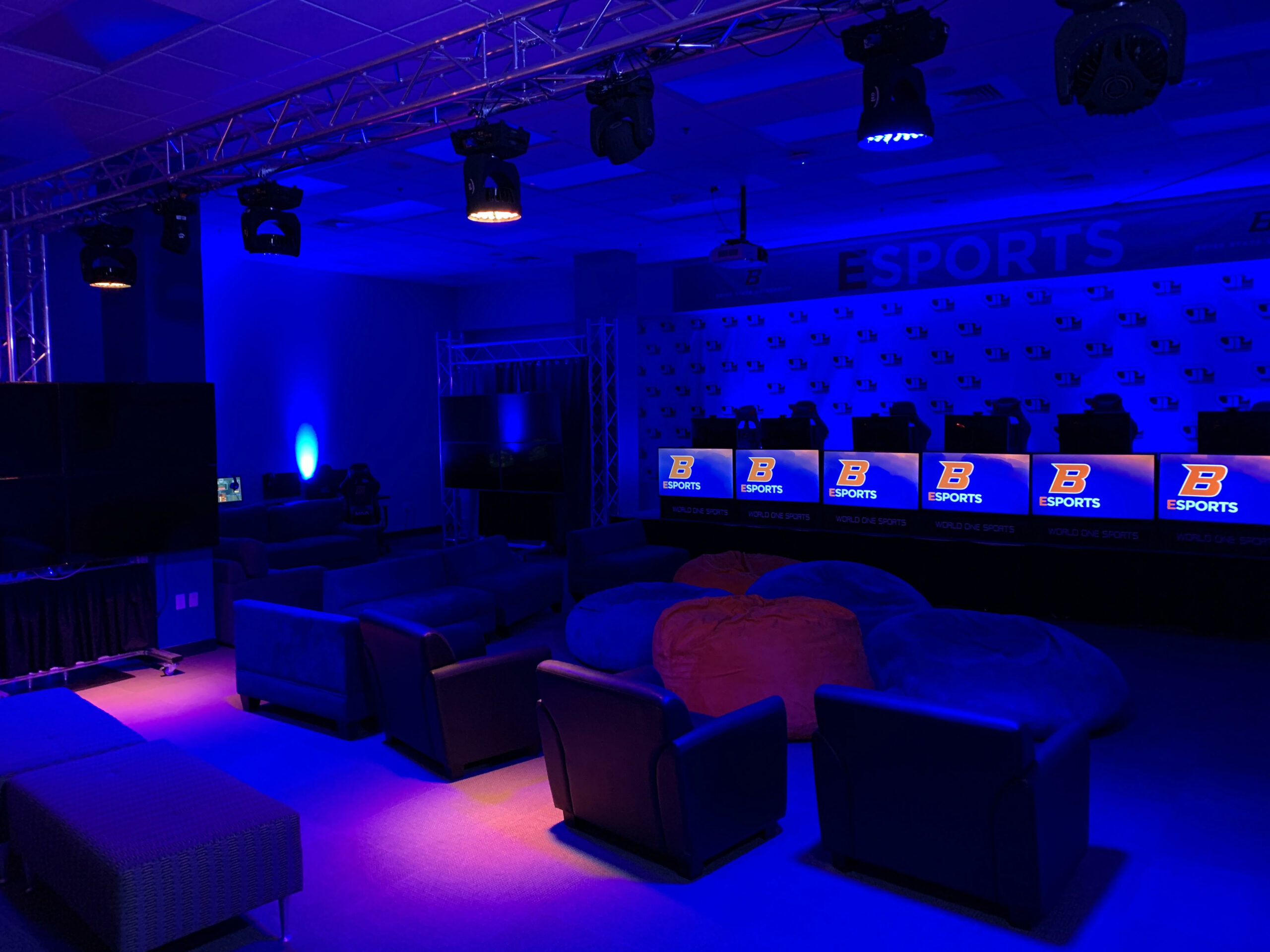
Doc Haskell hit a trifecta with his bold vision at Boise State, where he has managed to carve out three sparkling spaces for esports thanks to some big-time donations. Its Battleground features 24-30 seats and a very large area for spectators. It has a TV room. And it has a six-player stage where Boise does its broadcasting with original Blue Turf from its football field, circa 1989. Haskell quips, “There’s probably some DNA in it somewhere!”
“It is a really happenin’ space,” says Haskell, clinical associate professor and head of esports at Boise State. “It has tons and tons of theater and DJ lighting. We basically built a television station around our esports program. Our broadcast studio is more sophisticated in some ways than an actual television studio. It is central and core to the whole concept of esports, a method for storytelling.”
All told, Boise has 110 workstations, 30 of which are laptops that are getting used more frequently now because of the pandemic. The program streams to a number of different platforms and has good reason. All of its esports teams are perennially ranked in the top 10 and it boasts the most wins of any college esports program. Tie all of this into the academic side, where those interested in competitive gaming can major in Games, Interactive Media, & Mobile Technology, and you have an incomparable university esports experience.
FULL SAIL UNIVERSITY, Winter Park, Fla.
This small for-profit university campus in Winter Park, FL, is relatively nondescript from the outside (aside from its stunning movie-style back lots tucked behind its mirrored buildings). But once inside, the view is, well, overwhelming. Full Sail is home to The Fortress, an 11,200-square-foot esports arena, one of the largest of any in the United States. The space can accommodate 500 spectators. It has a 10-million-pixel LED wall and an enormous center floor that can house 100 gamers playing simultaneously.
“You have students doing production and working the lighting and doing the casting in there,” says Bennett Newsome, esports strategist at Full Sail. “So it’s the students driving this; it’s not faculty running all this stuff. Part of the goal is, we want our students to graduate with credits and experience.”
The key to the space, as Newsome mentions, is that is a complete production facility that not only can host small esports events but also large competitions. The practice room for its esports players is not large but features 15 top-of-line MSI computers for its 80-plus student athletes who play nine titles.
HARRISBURG UNIVERSITY, Harrisburg, Pa.
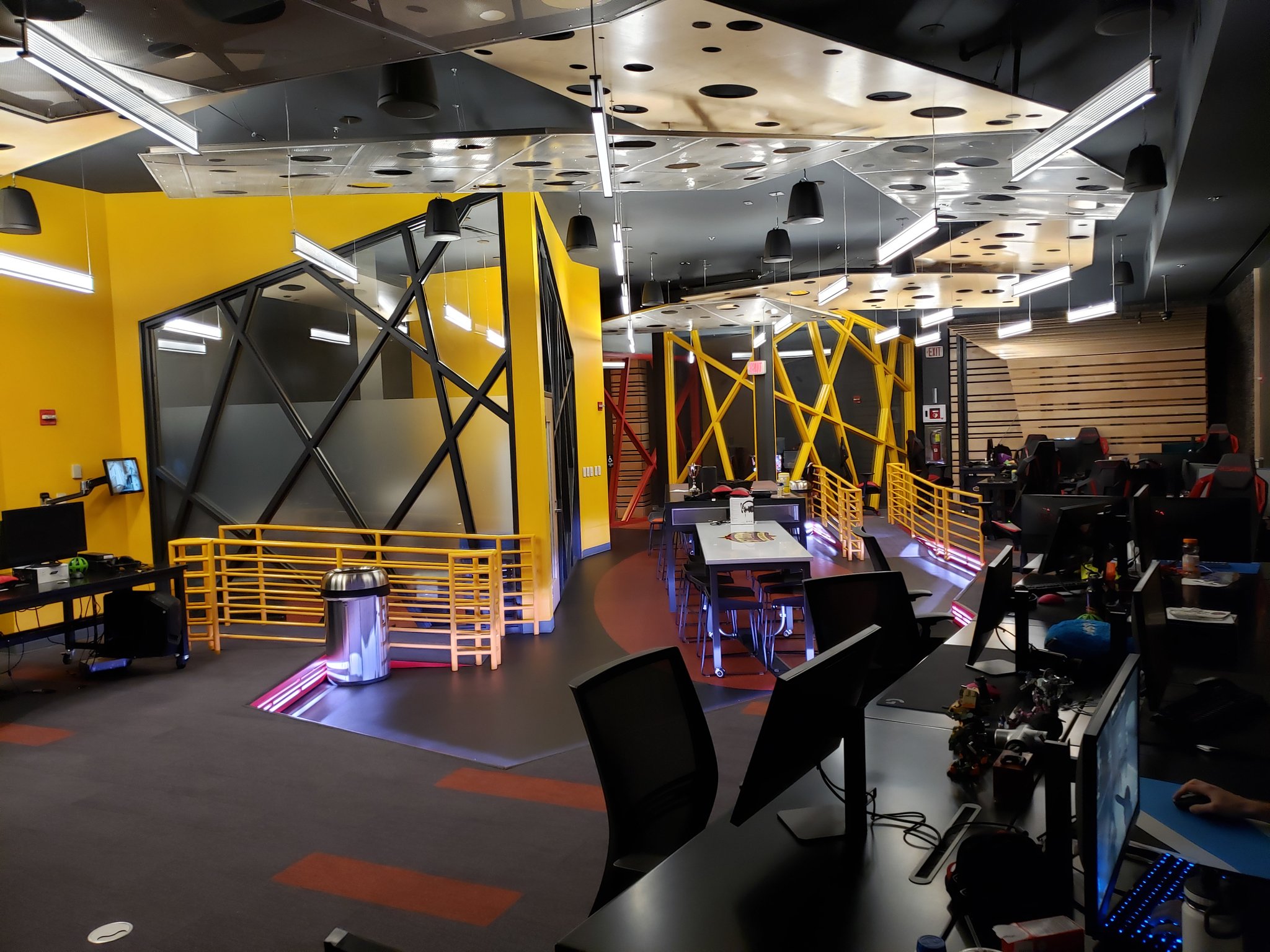
Harrisburg’s one and only varsity sports is esports. And it doesn’t take that lightly.
Undergraduate and degree programs are connected to it, advisory help comes from national esports infrastructure company Nerd Street Gamers and arena space comes courtesy of the region’s Whitaker Center for Science and the Arts, which is a program partner. It was the first college in the U.S. to offer full esports scholarships to student-athletes.
At Whitaker, the Storm not only has been given a 2,300-square-foot practice space, but it also has access to Select Medical Digital Cinema – a six-story, 200-seat former IMAX theater (with room for 700) with a 12,000-watt sounds system and the “largest movie screen in the area” – where it can host livestream events, tournaments, matches, and watch parties.
“Working together with HU on esports made sense on a number of levels,” Ted Black, president and CEO of the Whitaker Center, said during the partnership announcement. “It is a highly entertaining, visual and engaging form of entertainment. HU will provide a championship caliber team and Whitaker Center will provide a world-class facility.”
Black was right. The facility is one of the best in the nation and the HU Storm was crowned the 2019 National Champions in Overwatch.

